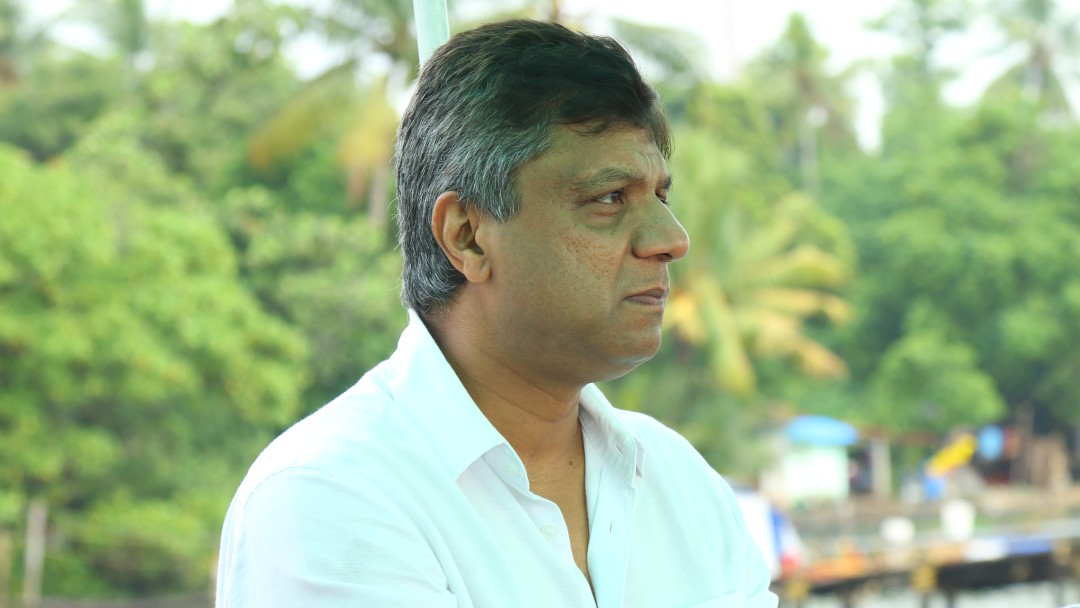News from 2017-05-31 / KfW Development Bank
Through Kochi by bus, train and water bus
Elias George is the Managing Director of Kochi Metro Rail Limited. The Southwest Indian city of Kochi is currently undergoing a fundamental change: it is introducing an integrated public transportation system that includes a new metro, ferries and buses and combines them into one schedule and centre of command. In the interview Elias George talks about the difficulties of such a shift and the role KfW plays in this.
Kochi is working on a fully integrated public transport system. What was the motivation for such a fundamental change?
One very important aspect was the traffic that was getting heavier constantly in Kochi: for many years the number of cars increased by around 12 percent annually. We realised that if we continued like that we would face a complete deadlock in the near future. So, some years ago we initiated a rail project that is encompassing the construction of a metro line through the city, measuring some thirty kilometres. It will be built in phases. We found the start of that project to be a good opportunity to completely restructure our means of public transportation.
What exactly does it include?
Right now our traffic is heavily relying on cars and buses and to some extent on ferries. You must know that one quarter of Kochi is located on the water, on different islands and peninsulas scattered out in the sea. Our goal is to not only expand all these means of public transportation but to bring the metro, the buses and the ferry boats into a single time table, a single command of control and a single ticket system.
How important are digital solutions in this endeavor?
They are very important. We want to use the whole intelligence available to command and connect all the different ways of public transportation. That is an essential part of our strategy. In the end customers should be able to see on their phone when the next bus, metro or boat comes. We want them to be able to swiftly and smoothly change between the various forms of transportation. This is our vision and we hope to have it implemented in a couple of years´ time.
Will it be difficult to bring about such a change?
It's still work in progress. The transition has not yet happened, frankly. We are working very hard on it. In 1.5 to 2 years when the full metro and new ferries will be in place we hope that people will change, leave their cars and move to public transportation. One good thing is: people in Kochi are very keen on the latest technology. We hope they will embrace the shift. Plus they see that the present traffic gets to its limits; it's breaking down and they feel that in their everyday lives.
What about the autonomous car? Will that also be part of your system?
We will be watching what's happening in other places of the world – in the US and Germany – and then react. I think technology, transport and energy will become combined, will become one. And we will see a sharing system. Kochi is open to all this but we first have to see how things develop. The Union Minister of transport has just recently announced very ambitious plans for e-mobility for India. How we in Kochi capture those developments we are looking into very seriously at the moment. I think we will be one of the frontrunners for these technological changes.
Do you expect the number of cars sinking in Kochi or will they just be transformed to more sustainable systems?
As far as cars are concerned we see two major trends: cars changing to electric and gas. And secondly: sharing. That's why I think the number of cars will ultimately be declining.
What is the role of KfW in this?
KfW came into Kochi when we understood that building a metro on land is not enough because, as I mentioned, Kochi is a seaside city. But the ferries were running low in the past years. So, we realised we need a big bang to change that. We therefore approached KfW that is now helping us to bring in about 70 to 80 new ferries. We are very pleased with the cooperation because it was fast and efficient. It has been a very constructive partnership with KfW so far.
Who will be benefiting most from this new system?
The whole city will of course benefit but the poor people in particular. That also holds true for the ferries because they connect some of the remoter areas to the city where as a tendency people live that are not so well-off. They will be able to reach the city center where the jobs are much easier than before.
Was it difficult to get the necessary financing?
Once we knew what we wanted to do money was not the big problem. The system´s change, the planning and the implementation are by far the bigger challenges, the latter involving for instance difficult land questions.
Is Kochi a model for India?
It's too early to say that Kochi has been a success but we are far advanced compared to other areas of India. I think Kochi will be the first city where you have a decent public transportation system that is accessible for everyone.
The interview was conducted by Friederike Bauer


Share page
To share the content of this page with your network, click on one of the icons below.
Note on data protection: When you share content, your personal data is transferred to the selected network.
Data protection
Alternatively, you can also copy the short link: https://www.kfw-entwicklungsbank.de/s/enzBWrMC.BlzA
Copy link Link copied